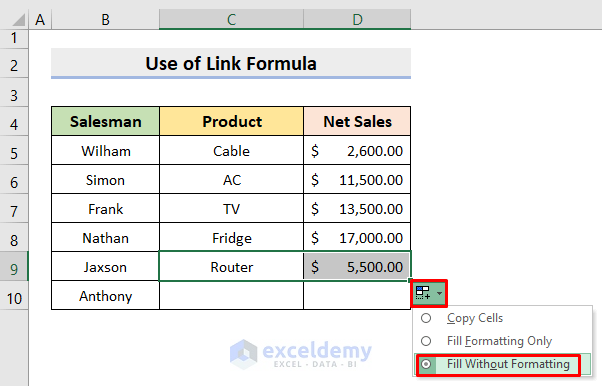Linking Excel Sheets: A Simple Guide

Linking Excel sheets can significantly streamline your data management, enhance productivity, and ensure consistency across multiple spreadsheets. Whether you're working on a small project, managing a large dataset, or simply trying to keep your financials in check, mastering the art of linking sheets will undoubtedly elevate your Excel experience. In this comprehensive guide, we'll walk through the different methods of linking sheets, explore their benefits, and provide tips for maintaining accuracy.
Why Link Excel Sheets?

Linking Excel sheets allows for:
- Efficient Data Management: Consolidate data from various sources into one central location without duplicating efforts.
- Real-time Updates: Changes in one sheet automatically reflect in linked sheets, reducing manual updates.
- Error Reduction: By linking data, you minimize the risk of manual data entry mistakes.
- Enhanced Collaboration: Teams can work on different sheets, yet maintain data integrity across documents.
Methods to Link Excel Sheets

1. Using External References

This method involves referencing cells in one sheet from another workbook or sheet:
- Open both workbooks you wish to link.
- Select the cell where you want the linked data to appear.
- Type the equal sign (=), followed by the workbook name, an exclamation mark (!), and the cell reference you want to link (e.g.,
=[Book1]Sheet1!A1). - Hit Enter. Your cell will now display the data from the referenced cell.
💡 Note: If you rename or move the source workbook, Excel will lose the link, so keep track of file names and locations.
2. Using Paste Special

Link cells using paste options:
- Copy the cell or range you want to link in the source sheet.
- In the destination sheet, right-click where you want to paste the link, choose “Paste Special”, and then “Paste Link”.
3. Hyperlinks

To link to a specific location in a workbook:
- Select the cell for the hyperlink.
- Go to “Insert” > “Hyperlink” or press Ctrl+K.
- Choose “Place in This Document”, select the destination, and click OK.
Advanced Linking Techniques

Linking Across Different Applications

Excel isn’t limited to linking within itself; you can link to other Office applications:
- Microsoft Word: Insert an Excel spreadsheet in a Word document, where edits in Excel reflect in Word.
- Microsoft PowerPoint: Embed Excel charts or data into slides for real-time updates.
Dynamic Linking Using Named Ranges

Named ranges make linking more readable and flexible:
- Name a range in the source workbook.
- In the destination workbook, reference this named range directly for cleaner and more maintainable links.
🔗 Note: Named ranges provide a level of abstraction, making links less prone to breaking when changes are made to the workbook structure.
Maintaining Link Integrity

To keep your linked sheets accurate:
- Regularly check for broken links via “Data” > “Edit Links”.
- Keep files in the same directory or use relative paths to prevent issues.
- Use the “Workbook Links” dialog to update link paths when moving files.
Best Practices for Efficient Linking

- Organize Your Data: Plan your data structure to avoid unnecessary linking.
- Use Consistent Naming: Standardize file and sheet names to simplify referencing.
- Avoid Over-Linking: Link only where necessary to maintain performance.
- Documentation: Document your links for future reference or for team collaboration.
Linking Excel sheets can be a transformative practice for anyone who manages large datasets or works collaboratively. By understanding and applying different linking methods, you can significantly boost efficiency, reduce errors, and keep your data synchronized across multiple documents. The real power of Excel lies in its ability to connect disparate pieces of data, allowing for a dynamic and responsive data ecosystem. Whether you're an accountant, a project manager, or a student, mastering these techniques will undoubtedly give you an edge in data management and analysis.
What is the difference between linking and embedding in Excel?

+
Linking connects data between sheets or workbooks, allowing for real-time updates. Embedding means inserting data as an object within another file, but changes don’t automatically sync between files.
Can I link to a specific range of cells in another Excel workbook?

+
Yes, you can link to a specific range. Use the syntax [WorkbookName]SheetName!Range (e.g., [Book1]Sheet1!A1:B5) to link to the desired range.
How do I prevent my links from breaking when moving or renaming files?

+
Use relative paths when linking, and consider using the “Workbook Links” dialog to update link paths if files are moved or renamed.
Are there any drawbacks to linking Excel sheets?

+
Yes, excessive linking can slow down workbook performance, and there’s a risk of broken links if files are not managed properly. Also, it might complicate data integrity if not done with care.
What are named ranges in Excel and how do they help in linking?

+
Named ranges are user-defined names for a cell or a range of cells. They make links easier to read and maintain, reducing the likelihood of errors when referencing data across sheets.